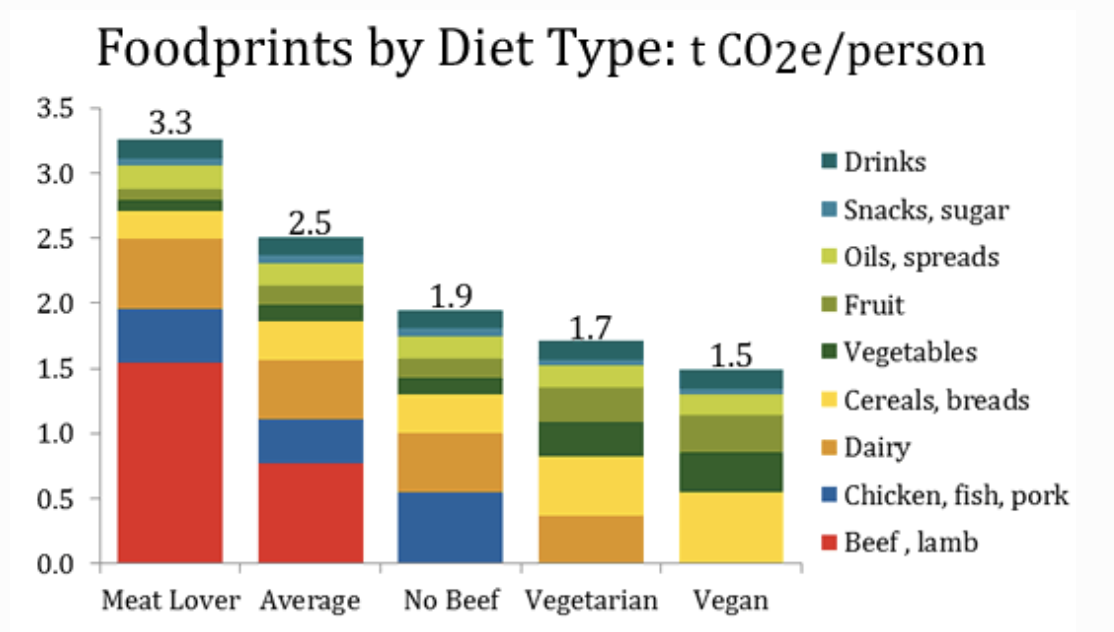Plant Eaters Vs. Meat Eaters: Two Perspectives
Meat-based vs plant-based? Which is the best diet for you and for the planet? Photo from LesMills.
Aayush Iyengar & Jonathan Wang
Advocating for a Vegetarian Diet: Aayush
Photo from Center for Nutritian Studies
Let’s say you walked into your favorite burger restaurant looking for some soul food to lift you up after a long day. You are ready to order your usual, but the waiter tells you about a new burger they are selling, the Impossible Burger. Intrigued by the name, you ask for the waiter to elaborate, but when he tells you that it is a strictly plant-based meal, you lose interest and proceed with your usual. But what if the waiter told you more? More about the benefits, not just for you as an individual, but for the environment. What if he told you about the almost negligible difference in taste or the rapidly increasing number of people that loved the Impossible Burger. The stigma that a plant-based protein will never live up to the hype of “real meat” has been proven false through many experiments and is the reason why vegetarianism as a whole is on the rise across the world.
To begin, let us dive into the taste of meat substitutes, such as the case with the Impossible Burger. According to Thrillist, an online food covering website, “I found that the Impossible™ patty tasted very more similar to beef. If I closed my eyes and pretended, it could definitely be mistaken for real meat.” Research conducted by the company that created Impossible meat showed that a specific molecule, Heme, was responsible for meat’s savory flavor, juicy texture, and unique smell. With soybeans (which have the most similar heme proteins as beef) as the base for the burger, the creators of the Impossible Burger were able to create the unmistakable aroma and taste of beef, in a totally beef-less product.
The other major concern surrounding a vegetarian diet centers around the possibility of a lack of nutrition. Logically, if you cut out meat from your diet, you would surely decrease your daily protein intake, right? Surprisingly, that is not the case. Even as vegetarians, there are very specific foods that you can eat in order to reach your desired nutritional goals. To compensate for the loss of high protein meats, you can create many delicious meals with tofu bases, eggs, avocados, mushrooms, chickpeas, and lentils. In fact, according to mayoclinic.org, “The best way to transition to a vegetarian diet is to gradually reduce the meat in your diet while increasing fruits and vegetables.” Slowly substituting, say beans for ground beef or extra firm tofu for chicken, will make the change to a vegetarian diet much easier. Going even further, processed meats, including meats that have been transformed through salting, curing, fermentation, etc in order to improve the meat’s flavor, have been proven as carcinogenic to humans, meaning that these processed meats have been proven to cause cancer (World Health Organization). Taking small steps to eliminate specific types of meat in your diet has been shown to reduce colorectal cancer and provide more energy, allowing for a healthier life.
To know that it is in fact very possible to develop or maintain an athletic physique on a vegetarian diet, look no further than some of the diets employed by a few world-class athletes. Nineteen-time Grand Slam Champion, Novak Djokovic, credited his rise from third place in the world to World #1 to his decision to go vegan because of how much less energy his body needed to digest between training sessions. NBA future Hall of Fame point guard Chris Paul also switched from meat to a plant-based diet to “reduce body inflammation.” The most important part: Paul credits his diets for allowing him to keep up with players half his age. Lastly, the world-famous Arnold Schwarzeneggar, known as a bodybuilder, the Terminator, and a former governor of California, ditched animal products in order to reverse his symptoms of heart disease. Now at 73, and a plant-based lifestyle advocate, he credits this change in diet for allowing him to feel much more energetic at his age. Although the majority of athletes have found success through diets that incorporate meat, that doesn’t discount the fact that world-class athletes also found success through planet-only diets.
The final benefit of a vegetarian or plant-based diet is its major environmental benefit. According to downtoearth.org, “Emissions from cows and sheep are responsible for 37% of the total methane (23 times as detrimental as CO2) production from humans.” In addition, the amount of water needed to produce a kilogram of beef varies from 13,000L to 100,000L, whereas the amount of water needed to produce a kilogram of wheat is around 1,000L to 2,000L. Looking at a huge economic benefit, according to a study from Time magazine, changing dietary patterns (to something more plant-based) could result in savings of $1 million annually by preventing health care costs and lost productivity. As the Earth’s population continues to grow, finding ways to decrease our ecological footprint are the key to engineering the sustainability of the planet for future generations of humans.
Although it is unlikely that our footprints will decrease for some time, making slight changes in your diet for this cause is doing your job as a member of this planet. That doesn’t mean eliminating beef or lamb or pork completely from your diet is the solution. But becoming more conscious about your own personal intake through the foods you consume, like with something as trivial as a burger, is the place to start and can lead to many personal as well as environmental benefits. So the next time you sit down, looking for a juicy burger, consider trying a plant-based substitute, for the differences that exist between the delicious, umami-flavor foods may not be as drastic as you once believed.
Advocating for a Meat-Based Diet: Jonathan
Photo from The Paleo Mom
A medium-rare steak is one of the best joys in life. From the charred exterior to the juicy red interior to the burst of umami, eating steak is a drug that will never lose its high. Even though steak has god-tier taste, many people still worry about the environmental and health effects of consuming meat. As such, many people may advocate for vegetarianism or veganism, and companies like Beyond Meat or Impossible Foods make quality plant-based meat, but none have created a steak substitute. These companies will have trouble replicating the flavor of steak because “real meat contains thousands of flavor molecules from proteins, fats, ketones, alcohols, and other molecules.” Meat should absolutely be in one’s diet for health benefits. Additionally, I will show that the environmental effects aren’t as extreme as others make them seem.
Surprisingly, meats have a nutritional advantage in some areas. Meats contain valuable nutrients like iron, zinc, magnesium, and B12 (ro.uow.edu.au). Plants barely have B12 according to health.harvard.edu. Furthermore, meat has higher bioavailability than plants. This fact means that iron and zinc from meat are absorbed more quickly and are more readily available than plants. The lower bioavailability for plants is due to the fact that a vegetarian or vegan diet has a higher consumption of phytic acid and other plant-based inhibitors of iron and zinc absorption (academic.oup.com). Additionally, meat provides complete protein or all 20 different types of amino acids, while plant-based foods (fruits, vegetables, grains, nuts, and seeds) are missing one or more essential amino acids (hsph.harvard.edu). Furthermore, it’s possible to survive on a meat-only diet. By consuming the entire animal, the Inuit gets all the vitamins and minerals from a pure meat diet (discovermagazine.com).
However, not all meat is created equally. Fish is very healthy. According to heart.org, fish is a healthy source of protein due to its low saturated fats, and fish has a high concentration of Omega 3, which is shown to reduce the risk of heart disease and stroke. Healtline.com further iterates that fish “contains iodine and various vitamins and minerals” and that “Omega 3 is crucial for optimal body and brain function.” Additionally, chicken is also healthy as it has less saturated fat than the amounts found in beef, cheese, and ice cream and it's a good source of protein (hsph.harvard.edu). “Protein is important for muscle and maintaining bone mineral density. Eating chicken can help to build stronger muscles and promote healthier bones, decreasing the risk of injuries and diseases such as osteoporosis” (Webmd.com). However, people may still be concerned about the health effects of saturated fat. Some studies show that saturated fat causes cardiovascular disease and higher cholesterol levels (nap.edu) while other studies suggest that high cholesterol levels are caused by genetics (ncbi.nlm.nih.gov). In other words, the effects of saturated fat are inconclusive.
A common argument from those opposed to meat in the diet states that red meat is bad for you; however, this is not necessarily true. Most studies indicate that red meats are bad (academic.oup.com), but these same studies are case-control studies. A case-control study is basically “taking a group of people with diseases, and classifying them by eating habits” (Kurzgesagt). This means it’s hard to filter out other factors. In the studies, the same people who ate less meat also generally lived healthier lifestyles in general, smoked less, and ate more veggies (ncbi.nlm.nih.gov). Studies try to factor these variables out, but it is hard to give definite conclusions. Basically, there isn’t concrete evidence to suggest anything conclusive about red meat being in the diet.
However, processed meat is definitely bad for you. The International Agency for Research on Cancer (an agency that's part of the World Health Organization) reviewed 800 studies over the past 20 years and found “that each 50 gram portion of processed meat eaten daily increases the risk of colorectal cancer by 18%.” So eat more chicken and fish and less processed meats, and you can eat red non-processed meats once in a while. All meats are not created equal.
Opponents to a meat-eater’s diet claim that eating meat will end the world through greenhouse gasses. However, the net reduction of greenhouse gasses production would be 2.6% if all 330 million people in the US switched to a vegan diet (pnas.org). This is because limiting livestock would eliminate a form of recycling. According to the same study, livestock recycles more than 43.2 billion kg of human-inedible food and fiber processing byproducts, converting them into human-edible food, pet food, industrial products, and 4 billion kg of Nitrogen fertilizer. Additionally, livestock consume substantial amounts of byproducts from food, biofuel, and fiber production that are not edible by humans, and they make use of untillable pasture and grazing lands that are not suitable to produce crops for human consumption. Additionally, the study found that eliminating meat would “increase deficient essential nutrients and excess of energy in the US population’s diet.”
If people want to save the environment, a more effective strategy would be to stop wasting food. According to fao.org, ⅓ of the food we produce is wasted. If we add up all the emissions created from wasted food, it would beat out all other countries except China and the U.S. Furthermore, the cost of all the wasted food is $936 billion.
I believe that eating leftovers and not buying too much food is a better strategy than switching to a plant only diet. In other words, finishing that real hamburger is more beneficial than eating half of an impossible burger and throwing it away. Due to the health benefits of meat, I will continue to enjoy my medium-rare steak down to the last bite.










